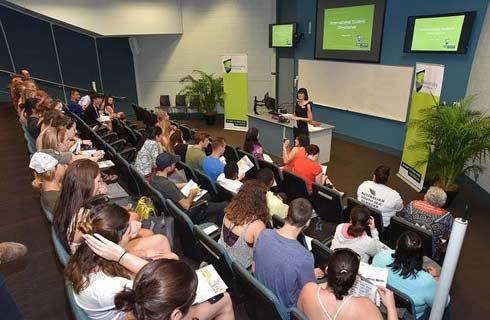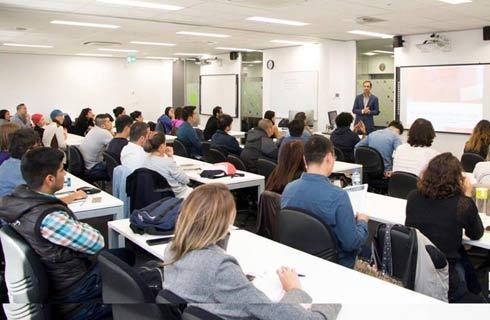国际可持续旅游管理硕士
Master of International Sustainable Tourism Management

学历文凭
Masters Degree (Coursework)

专业院系
Faculty of Arts

开学时间

课程时长

课程学费

国际学生入学条件
Entry level 1: 96 points to complete Duration: 2 years full-time, 4 years part-time
An Australian bachelor degree (or equivalent) with at least credit (60%) average, or equivalent qualification and experience approved by the faculty.
Entry level 2: 72 points to complete Duration: 1.5 years full-time, 3 years part-time
An Australian bachelor degree (or equivalent) in a cognate discipline including humanities or social sciences with at least credit (60%) average, or equivalent qualification and experience approved by the faculty
Or
An Australian bachelor degree (or equivalent) and an Australian graduate certificate (or equivalent) in a cognate discipline including humanities or social sciences with at least a 50 percent average in both qualifications, or equivalent qualification and experience approved by the faculty
Entry level 3: 48 points to complete Duration: 1 years full-time, 2 years part-time
An Australian bachelor honours degree (or equivalent) in a cognate discipline including humanities or social sciences with at least credit (60%) average, or equivalent qualification and experience approved by the faculty
Level A
IDP—雅思考试联合主办方

雅思考试总分
- 雅思总分:
- 托福网考总分:
- 托福笔试总分:
- 其他语言考试:
CRICOS代码: 078909K
申请截止日期: 请与IDP联系 以获取详细信息。
课程简介
Sustainability increasingly influences tourism planning, development, governance and management as the industry expands globally. As the growth rate of emerging economies doubles that of advanced economies in the years leading to 2030, sustainable tourism plays a significant role in the achievement of the United Nations Millennium Development Goals. This course meets the growing demand for specialists in tourism planning, marketing and industry management who not only have a broad and deep understanding of global business activity, but also a clear insight into the consequences of planning and policymaking on the environment, society, culture and the economy. In this industry-focussed course you will explore sustainable organisations across urban and rural development and regeneration; natural resource management and wildlife conservation; and the diversifying benefits from international and domestic tourism. You will gain enhanced practical and analytical skills to develop tourism policies and practices built on sustainable practice in a global setting. Our academic staff are widely regarded as research pioneers in the field of high-yield, independent (or backpacker) travel, and the associated impacts on urban tourism and the development of small- and medium-sized enterprises. To broaden your understanding of the international market and the role that a sustainable tourism industry can play in emerging economies, study overseas. You can attend a partially funded intensive field school to examine the patterns of development within an Asia-Pacific emerging economy, such as Fiji, Vietnam or Cambodia. Or you can participate in an international student exchange semester at one of our prestigious partner universities in Sweden, Estonia or Latvia. Graduates are employed in a variety of government and private-sector tourism organisations: state, regional and national tourism offices; management consultancy firms; advertising agencies; media and TV research and journalism; internet communication organisations; local government tourism agencies; international education organisations; and airline and tour operators.
相关申请
 预科
预科 奖学金
奖学金 实习机会
实习机会 在校学习
在校学习 跨境学习
跨境学习 校园授课-线上开始
校园授课-线上开始 在线/远程学习
在线/远程学习
开学时间&学费
学费信息仅供参考,请与IDP联系以获取详细信息
| 开学时间 | 时长 | 学费 | 地点 |
|---|
学校排名

世界排名84
数据源:
泰晤士高等教育世界大学排名
关于蒙纳士大学

蒙纳士大学(Monash University),世界百强名校,是澳洲八大名校(Group of Eight)的盟校成员。于1958年由国会建立,是维多利亚州的第二所古老的大学,为纪念杰出的澳大利亚军人、学者兼工程师约翰·蒙纳士爵士,大学以其姓氏命名。蒙纳士大学以其卓越的教学和精湛的科研而在国际拥有声誉,蒙纳士是澳大利亚规模最大的国立大学之一,其综合实力在各大学中名列前茅,也是著名的密集研究型大学,被评为澳大利亚五星级大学。并在四大洲多个国家设有校区和科研中心,与全球科研领域与高校紧密合作,在北美,欧洲,英国,亚洲以及非洲建立了合作关系并结为联盟。蒙纳士在墨尔本有七个校区,每个校区皆各具特色。蒙纳士大学拥有包括澳大利亚肝细胞中心等100个研究中心和17个合作研究所,是澳洲主要的国内研究机构。
本校相关课程

健康科学学士(荣誉学位)
学历文凭
Bachelor Degree with Honours
开学日期
课程费用总额


建筑学硕士
学历文凭
Masters Degree (Coursework)
开学日期
课程费用总额


美术学士(荣誉学位)
学历文凭
Bachelor Degree with Honours
开学日期
课程费用总额


商科研究生证书
学历文凭
Graduate Certificate
开学日期
课程费用总额


专业会计硕士和商法硕士
学历文凭
Masters Degree (Coursework)
开学日期
课程费用总额


外科硕士
学历文凭
Masters Degree (Research)
开学日期
课程费用总额

其他相关课程

应用项目管理研究生证书
 阿德莱德大学
阿德莱德大学学历文凭
Graduate Certificate
开学日期
课程费用总额


商业研究硕士
 阿德莱德大学
阿德莱德大学学历文凭
Masters Degree (Coursework)
开学日期
课程费用总额


应用项目管理研究生文凭
 阿德莱德大学
阿德莱德大学学历文凭
Graduate Diploma
开学日期
课程费用总额


工商管理研究生证书
 阿德莱德大学
阿德莱德大学学历文凭
Graduate Certificate
开学日期
课程费用总额


创新与创业学士
 阿德莱德大学
阿德莱德大学学历文凭
Bachelor Degree
开学日期
课程费用总额


邦德大学学院预科课程
 邦德大学学院
邦德大学学院学历文凭
Foundation
开学日期
课程费用总额










